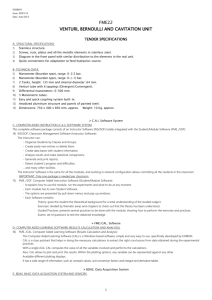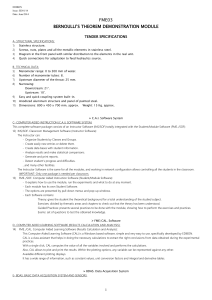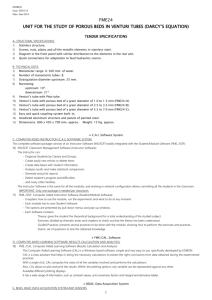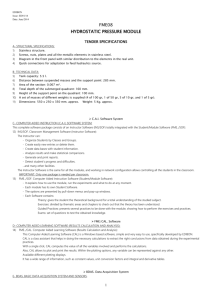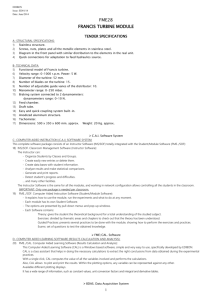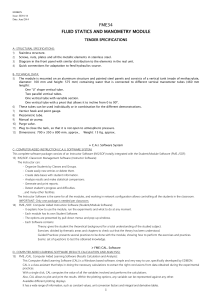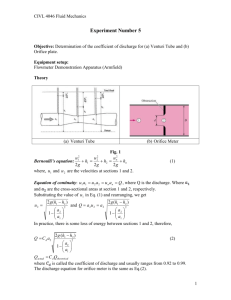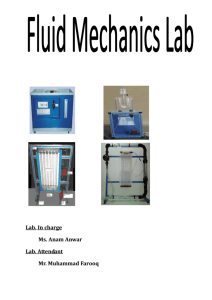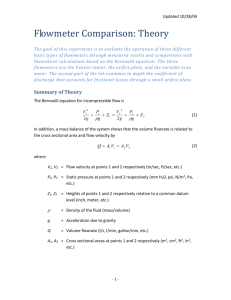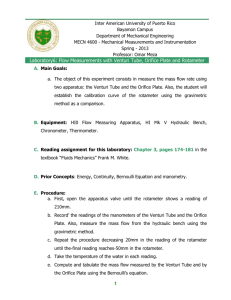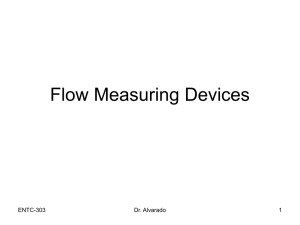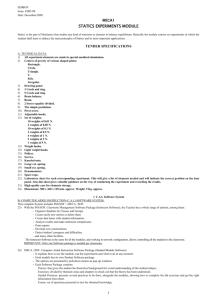FME18 - Edibon
advertisement
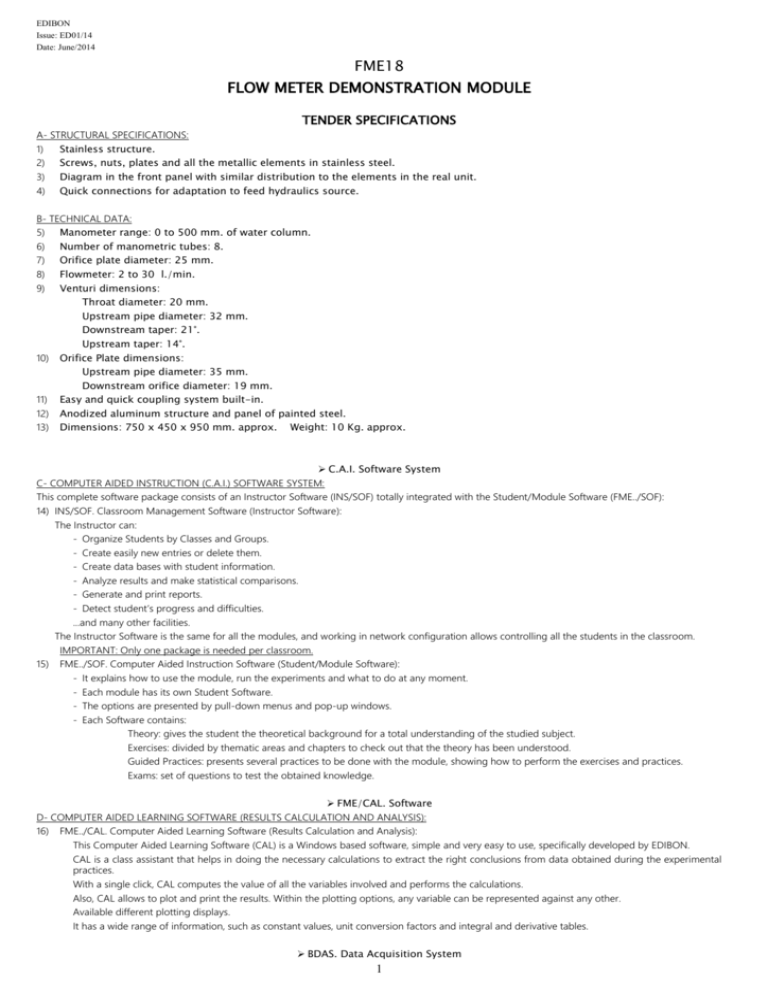
EDIBON Issue: ED01/14 Date: June/2014 FME18 FLOW METER DEMONSTRATION MODULE TENDER SPECIFICATIONS A- STRUCTURAL SPECIFICATIONS: 1) Stainless structure. 2) Screws, nuts, plates and all the metallic elements in stainless steel. 3) Diagram in the front panel with similar distribution to the elements in the real unit. 4) Quick connections for adaptation to feed hydraulics source. B- TECHNICAL DATA: 5) Manometer range: 0 to 500 mm. of water column. 6) Number of manometric tubes: 8. 7) Orifice plate diameter: 25 mm. 8) Flowmeter: 2 to 30 l./min. 9) Venturi dimensions: Throat diameter: 20 mm. Upstream pipe diameter: 32 mm. Downstream taper: 21°. Upstream taper: 14°. 10) Orifice Plate dimensions: Upstream pipe diameter: 35 mm. Downstream orifice diameter: 19 mm. 11) Easy and quick coupling system built-in. 12) Anodized aluminum structure and panel of painted steel. 13) Dimensions: 750 x 450 x 950 mm. approx. Weight: 10 Kg. approx. C.A.I. Software System C- COMPUTER AIDED INSTRUCTION (C.A.I.) SOFTWARE SYSTEM: This complete software package consists of an Instructor Software (INS/SOF) totally integrated with the Student/Module Software (FME../SOF): 14) INS/SOF. Classroom Management Software (Instructor Software): The Instructor can: - Organize Students by Classes and Groups. - Create easily new entries or delete them. - Create data bases with student information. - Analyze results and make statistical comparisons. - Generate and print reports. - Detect student’s progress and difficulties. ...and many other facilities. The Instructor Software is the same for all the modules, and working in network configuration allows controlling all the students in the classroom. IMPORTANT: Only one package is needed per classroom. 15) FME../SOF. Computer Aided Instruction Software (Student/Module Software): - It explains how to use the module, run the experiments and what to do at any moment. - Each module has its own Student Software. - The options are presented by pull-down menus and pop-up windows. - Each Software contains: Theory: gives the student the theoretical background for a total understanding of the studied subject. Exercises: divided by thematic areas and chapters to check out that the theory has been understood. Guided Practices: presents several practices to be done with the module, showing how to perform the exercises and practices. Exams: set of questions to test the obtained knowledge. FME/CAL. Software D- COMPUTER AIDED LEARNING SOFTWARE (RESULTS CALCULATION AND ANALYSIS): 16) FME../CAL. Computer Aided Learning Software (Results Calculation and Analysis): This Computer Aided Learning Software (CAL) is a Windows based software, simple and very easy to use, specifically developed by EDIBON. CAL is a class assistant that helps in doing the necessary calculations to extract the right conclusions from data obtained during the experimental practices. With a single click, CAL computes the value of all the variables involved and performs the calculations. Also, CAL allows to plot and print the results. Within the plotting options, any variable can be represented against any other. Available different plotting displays. It has a wide range of information, such as constant values, unit conversion factors and integral and derivative tables. BDAS. Data Acquisition System 1 EDIBON Issue: ED01/14 Date: June/2014 FME18 FLOW METER DEMONSTRATION MODULE E- BDAS. BASIC DATA ACQUISITION SYSTEM AND SENSORS. F- MANUALS: This module will be supplied with the following manuals: 1. Required services manual. 2. Assembly and installation manual. 3. Interface and control software manual (if it is necessary). 4. Starting-up manual. 5. Safety manual. 6. Maintenance manual. 7. Calibration manual (if it is necessary). 8. Practices manual. G- PRACTICES: This module is designed to be able to do the following practices: 1. Filling of the manometric tubes. 2. Determination of the error in flow measurements using the Venturi. 3. Determination of the Cd factor in the Venturi. 4. Determination of the strangulation in the Venturi. 5. Determination of the error in flow measurements using the orifice plate. 6. Determination of the Cd factor in the orifice plate. 7. Determination of the effective area in an orifice plate. 8. Comparison of the energy loss in the three different elements. 9. Comparison among the Venturi, the orifice plate and the flowmeter. 2
